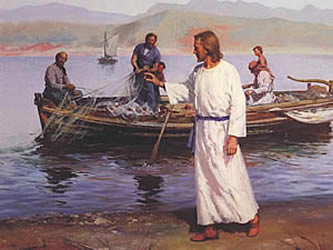Misconception #35
The Call of Christ Comes Unexpectedly and Unannounced
As if tradition itself weren’t potent enough, add to that the power of melodrama, and together you have two of the most irresistible weapons in the arsenal of anyone looking to create a great misconception of The Bible.
In this case, what we have is an itinerant preacher by the name of Jesus of Nazareth Who’s going about the Judean countryside and indiscriminately challenging people to join His ministry. As Scripture portrays it:
Jesus was walking by the Sea of Galilee when He saw Peter and his brother, Andrew, fishing. Then Jesus said, “Follow Me, and I’ll make you fishers of men.” Immediately, the two of them left their nets, and began following Him.
From there, Jesus continued on His way, finding two more brothers, James and John, the sons of Zebedee, who were sitting in a ship with their father as they mended their nets. He called out to them, and immediately they put down their nets and followed Him.1
Then, later:
Jesus saw a man named Matthew, who was sitting in the seat of the tax collector, and He said to him: “Follow Me.” So he got up and followed Jesus.2
Now, upon reading this, we naturally get the impression that Jesus is just wandering about, haphazardly tossing out His divine calling card to whomever He happens to meet. Someone strikes His fancy, He blurts out an invitation to follow Him in His spiritual quest, and that person instantly drops everything after but a single, brief encounter with this mysterious yet charismatic stranger. Abandoning their old lives, these men, at a moment’s notice, decide to follow Jesus, never once questioning the motives of this Man Who’s demanding such an apparently hasty decision from them. Pretty gutsy stuff, if you ask me.
Still, I wonder: Did it really happen the way tradition has portrayed it for so many centuries? Did they all just drop everything that suddenly?
Story Continues Below
Says Richard Price—the founder and CEO of Academia.edu—on his podcast In Depth With Academia:
Fish Tales (From the Belly of the Whale): Fifty of the Greatest Misconceptions Ever Blamed on The Bible is:
To hear Price’s book review of Fish Tales (From the Belly of the Whale), CLICK HERE.
To hear Kent and Zen Garcia talk about correcting biblical misconceptions, from September 9th, 2021, CLICK BELOW.
Story Continues From Above
“Of course it happened that way,” you’d insist, “because Scripture uses the word ‘immediately’ in describing their reaction to Jesus, doesn’t it?”
“Well, yes, I do admit that it does; but as usual, I still can’t help thinking there’s something missing here. As usual, I find it so tempting to disagree with the traditional interpretation of events as they’ve been neatly handed down to us.”
“But why, you may ask? Why are you always so prone to doubt the authenticity of The Bible?”
To which I’d reply, “It’s not Scripture that I doubt. What I’m questioning is the view that when, as potential converts of Christianity—which the twelve disciples obviously were—we’re expected to drop everything at the proverbial ‘drop of hat.’ I’m questioning the assumption that anyone who wishes to follow Christ must do so with the same reckless abandon as these first converts. And I am especially questioning the attitude that, in order to properly follow Christ, we must do so with a kind of ‘blind’ faith.”
According to this view, it seems as though we’re only acceptable in His sight if we throw away everything of our earthly life and hurl ourselves into the void, and all because that’s the way the early disciples did it. That’s what I’m questioning—something that, quite frankly, amounts to an over-simplified, romanticized view of accepting the call of Christ.
Now, again, before anyone accuses me of heresy because I seem to be disagreeing with the clear-cut demands of Jesus, let’s first review this traditional scenario in light of the three laws of disinformation. In other words, let’s revisit the total narrative of these encounters with Jesus in order to provide the context to His call of the disciples. Fair enough? Good, then let’s do just that.
Naturally, our first order of business is to see if there are any variations of this rendition of history amongst the gospel writers themselves. Fortunately, we do find such a thing in Mark’s account.








